Dear Reader, in this age of AI created content, please support with your goodwill someone who works harder to provide the human-made. Sign up in the righthand column or bottom of this page. You will receive my hand illustrated monthly newsletter RESTORE NATURE and access to the biodiversity garden design course as I write...and nothing else, I respect your time.
container gardens
why choose a container garden ?
One frequently has to resort to making a
container garden, because of lack of space, however there are containers in probably every garden, and sometimes
they are a feature of the landscaping of the garden.
The lack of space may take many forms: living in a flat or apartment, and making an indoor or balcony garden, or living in a house with very limited garden space, basically an alley, or with a very small courtyard that has hard paving everywhere.
One may also need to grow vulnerable plants in containers to protect
them from pests, or to contain the plants in order to provide the right kind
of soil, or to be able to take them indoors in winter, or to enable growing a
vertical garden.

Stretching the soil in a container garden
I've found that adding vermicompost, which can really be produced anywhere, in anything, as well as stone and bone meal, or a little sprinkling of clay, prolonged the life of the soil but with a container garden on the fifth floor, schlepping soil becomes a problem at some stage or other. I made my own soil by mixing sand and grated recycled polystyrene, thinking about reducing the carrying. Boy did that create a problem ! It rose to the surface during watering and blew everywhere, becoming permanently integrated into all the carpets of my rented apartment.
Problems and solutions when choosing the containers themselves
The first thing is to choose attractive planters for your container garden. It sounds banal, and you may think that the flourishing vegetation in container garden masks the ugly containers, but a collection of a mix of tins and plastic bottles, bags and so forth usually looks terrible because it is confused and messy. That said, if for example, say the tins or bottles have a uniting feature, they can be made to look eclectically interesting. The more of an eye you have for this kind of thing, the more likely it is to work, and we all have to start learning these complex lessons somewhere. Sameness, and pretty pots to start off with are just easier and safer… you can also make a feature of the eclectic nature of the garden containers by painting them in very bright colours, rootsy style.
I started off and came back to having all my pots the same colour, as a basis… boring, I know. In the first balcony garden they were all white plastic boxes, as were all the trellises. In the most recent alley garden, they were all painted terracotta or left black. People grow plants in broken teapots etc. but this tends to look better when all the planters are interesting antiques, or nice to look at in some way, rather than one teapot, one clay pot, one black bag, one rusty peeling tin etc. but that is just my opinion.
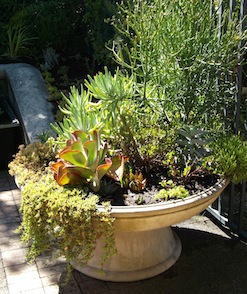 A container garden of mixed succulents in a single beautiful pot outside the kirstenbosch nursery.
A container garden of mixed succulents in a single beautiful pot outside the kirstenbosch nursery.for all the inspiration you could want, Kirstenbosch National Botanical gardens
Choosing containers for vertical gardens
In between I had a vertical garden with planters made of plastic milk-bottles with handles strung on a wire frame. It really looked awful until the vegetation overwhelmed the containers, but this cover too, was limited. The plants die off and are rather small, so the bottles never became entirely covered. The transparent juice bottles looked better than the milky milk bottles. The view of roots and soil added to the visual interest, even turning green, giving the mossy greenhouse type of look I like so much, whereas the milky bottles with black soil behind just look dirty. A problem with vertical container gardens, all those I’ve seen contain numerous pots of dead plants. One ideally needs a backup nursery of waiting plants growing on in the same pots you use in the vertical garden.
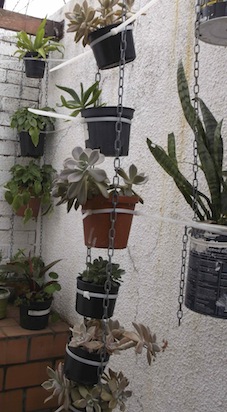
Design ideas for the pot collection in the container garden
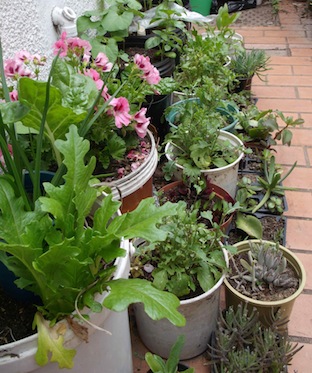
These ideas are on the informal end of the spectrum:
carpeting with small pots
Design ideas that have worked for me, were lots of little pots mostly identical (old black silkscreen pigment containers) with an occasional red plastic pot dotted about, full of succulents standing pressed together on the paving of the alley with a sweeping wave line. The way you see the plant displays in a nursery, it has a kind of horticultural aesthetic which isn’t faking nature and is quite pleasant.
pot chains
large pots hung on chains one above the other, in long vertical columns with good clearance between. The tiny pots were too flimsy and blew about in the wind and got in my hair, which was rootsy at the time. The big heavy, 5 liter pots bursting with luxuriant foliage worked the best
vertical gardens on frames
There is a beautiful vertical garden in this coffee shop courtyard in Observatory. All the walls down on the outer side are covered, with occasional smaller walls on the inside, against the house. All the pots are in brown plastic planters, fastened to a metal frame with cable ties, from floor to overhead pergola beams. They are angled out a bit presenting a wall of ovals but the soil runs out and the plants sometimes die, and I think the pots could better be hung vertically. They are sumptuously planted with ferns, bizzy lizzies, African violets, shade loving succulents like the green strings of beads, staghorn ferns, orchids and more.
other types of massed pots
I've also seen gardens consisting of all shapes and sizes of clay bots sitting cheek by jowl,
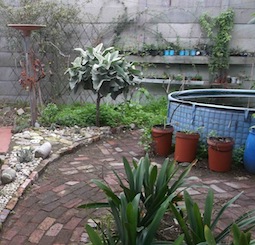
pots packed on shelves
Also surprisingly, my succulent nursery often looks lovely, it has shelves consisting of weathered wooden planks hung against a sunny wall, in slings of coloured string, and it is stuffed with little growing pots. It's got a kind of greenhouse aesthetic which I like. But this is helped by the tangle of creepers surrounding the nursery.
vegetables in large buckets dotted about
growing vegetables in 20 litre buckets containing 50/50 sand – vermi-compost produces lovely chard, herbs, and even allowed the razor sharp pineapple plant to produce flowers ! These pots are dotted around on our raised stone vegetable bed, and look quite good.
ideas more on the formal end of the spectrum:
massive pots
Massive planters have the danger of showy monolithic ‘hotel’ aesthetics, and here especially, the planters need to be really beautiful. Pairing the pots on either side of a garden "doorway" between one landscaping element and the next, is an easy winner. Here the plantings work well if identical but don't have to be as spectacular or lovely to look at as features, as the plantings in massive stand alone pots. Here is a massive planter I constructed out of bricks in the middle of my rather boring front porch.
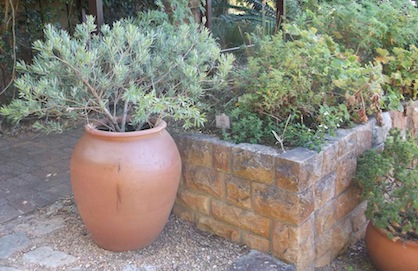
greenhouses
The most beautiful greenhouses I've seen were not very rigidly organised. One was that of my Mom’s friend Ted Schelpe, housing his collection, in a beautiful wooden greenhouse, full of real ceramic pots and decaying branches bursting with orchids, all labeled with genus and species names of course. He was a botanist and orchid specialist and he'd been in the jungles of Samoa and other exciting sounding places in his youth. The other was the old greenhouse in the company gardens, and it still beats the giant hi tech hothouse containing arid climate vegetation, at Kirstenbosch, for me anyway, because of its atmosphere. Fleeing the pre digitization admin grind in the bank, at lunch hour, alone in tepid stillness, I’d sit on the wall of the cement cistern watching the goldfish in its algae blackened depths. The airspace was vertically filled by curtains of long trailing vegetation hanging from way up in the roof, where
the glass was greenish and dusty. It was a botanical cathedral, dedicated to the worship of tropical chlorophyll. Most of the hard concrete features were streaked with green moss, and there were riots of clay pots stuffed into every corner, every shelf, somewhat less thoroughly labeled with genus and species tags. I regret its passing, and don't know why they took it down. Maybe it imploded around a vacuum of disregard for its fuddy duddiness. Alas, I have no photographs, only memories.
---------
----------
-----------
------------
------------
----------
------
vegetable gardening the natural low cost way
-----------
Restore Nature Newsletter
I've been writing for four years now and I would love to hear from you
Please let me know if you have any questions, comments or stories to share on gardening, permaculture, regenerative agriculture, food forests, natural gardening, do nothing gardening, observations about pests and diseases, foraging, dealing with and using weeds constructively, composting and going offgrid.
SEARCH
Order the Kindle E-book for the SPECIAL PRICE of only
Prices valid till 30.09.2023
Recent Articles
-
Geography Research Task
Jan 31, 25 11:37 PM
To whom it may concern My name is Tanyaradzwa Madziwa and I am a matric student at Springfield Convent School. As part of our geography syllabus for this -
Eco Long Drop Pit Latrines Uganda
Nov 29, 24 02:45 AM
Good evening from the UK. My name is Murray Kirkham and I am the chairman of the International and foundation committee of my local Lindum Lincoln Rotary -
Landscape Architect
Oct 01, 24 10:42 AM
I so appreciate your informative description! Your experimentation and curiosity with the seeds, germination, and rearing of the maggot are exciting to
"How to start a profitable worm business on a shoestring budget
Order a printed copy from "Amazon" at the SPECIAL PRICE of only
or a digital version from the "Kindle" store at the SPECIAL PRICE of only
Prices valid till 30.09.2023





